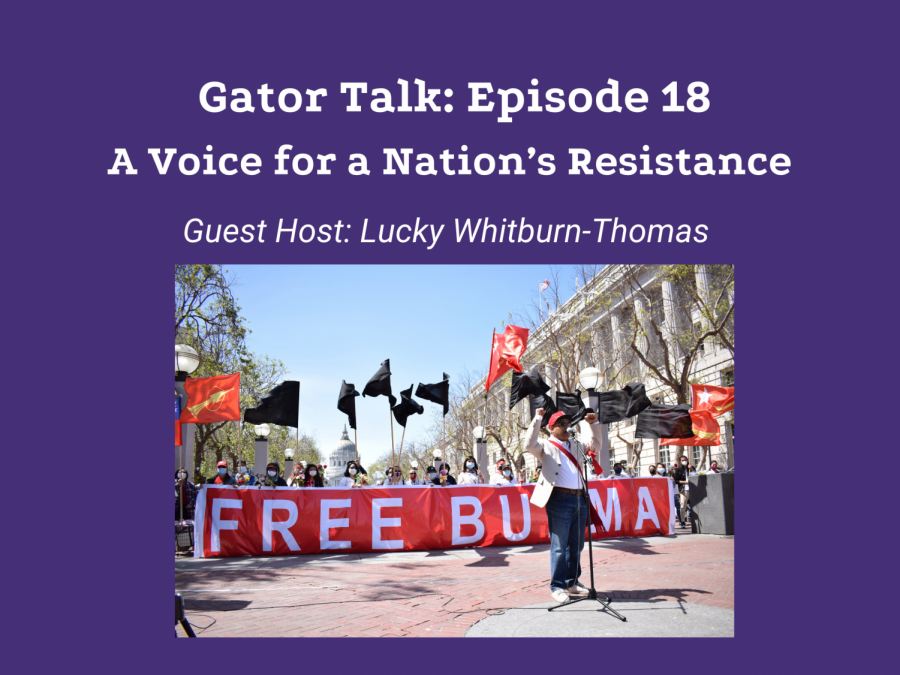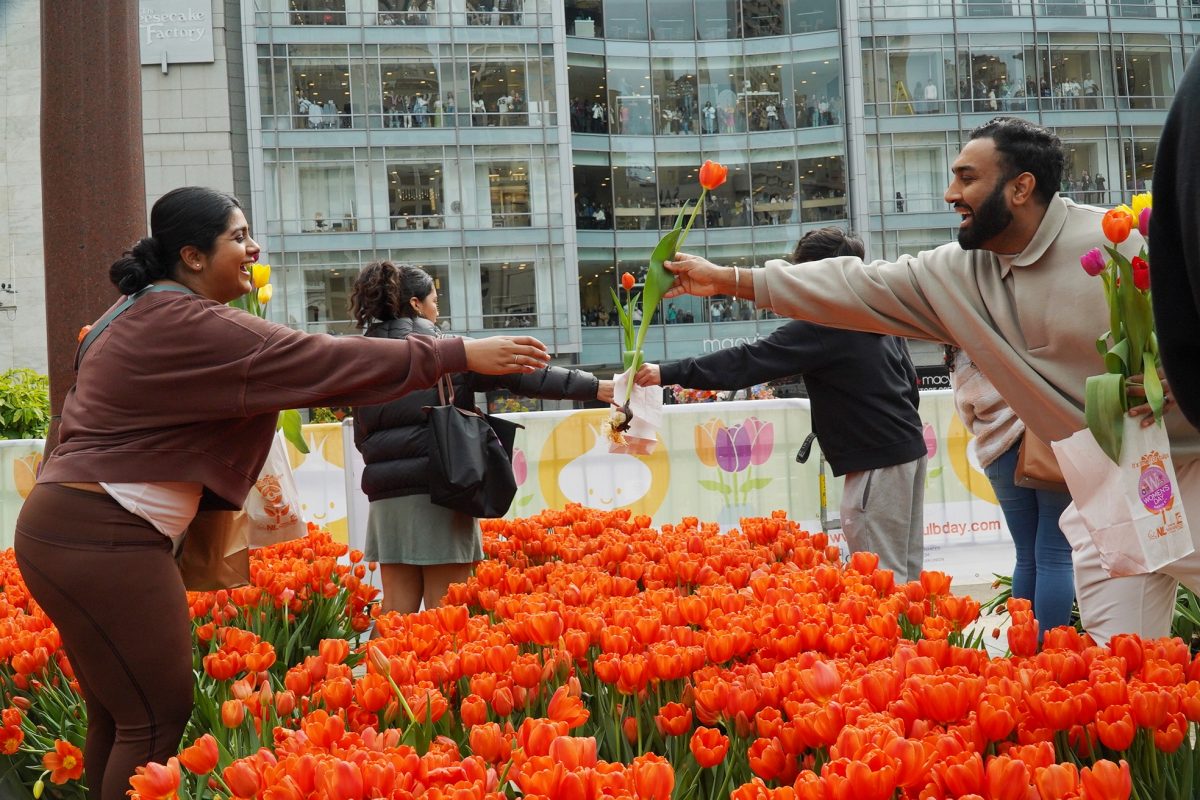Welcome to Gator Talk, a collaborative CalState podcast that brings city and statewide perspectives to SF State news.
Guest host Lucky Whitburn-Thomas tells us the story of Me Me Khant, a local spoken word poet and how she began writing poetry in Myanmar during a revolution in 2007.
As of recently, Myanmar is back in the news because of the military recall of the presidential elections in a coup d’état that placed the civilian leader, Aung San Suu Kyi, under house arrest despite winning 83% of the vote in the November 2020 election.
Me Me Khant became a graduate student at Stanford, studying international policy, and an active organizer with San Francisco’s Free Burma Action committee. She continues to organize and to support the protesters in her country and use her most powerful tool: poetry.
TRANSCRIPT:
Intro
*Salsa song fades in*
Seb: Hola que tal, this is Sebastian Miño-Bucheli, the multimedia editor for Golden Gate Xpress and your host for Gator Talk, a Golden Gate Xpress podcast that brings news to SF State students.
For more information/coverage, check out goldengatexpress.org OR @GatorTalkPod on all social media platforms.
Preview of the show
Seb: Here’s a quick preview of the show.
I’ll be updating the audience with a quick news brief with news that happened this week that matters to SF State students.
Lucky Whitburn-Thomas, photographer for Golden Gate Xpress, will be leading on for the main story.
Alright, here’s the news brief.
News brief
-California Gov. Gavin Newsom said to Fox News he may end the mask mandate June 15, when California reopens the state economy. Gov. Newsom clarified that usage of masks will be needed if you’re indoors with a large group or if you’re in a dense place. So … please get vaccinated before June 15.
-From CNN: Israeli airstrikes have killed at least now 48 people, with 300 people injured. The UN warns “full-scale war” with escalations between Israel and Palestinians.
Main Story
Lucky: On a hot afternoon in September of 2007, what was soon to become one of chaos in Myanmar’s biggest city, Yangon, 11-year-old Me Me Khant was taking her school exams when she and her classmates were suddenly dismissed and told that protesters were clashing with military forces in downtown just outside the school.
Seb: That’s Lucky Whitburn-Thomas. He is talking about Me Me Khant, a local spoken word poet, and how she began writing poetry while growing up in Yangon, Myanmar, during the Saffron Revolution, which eventually led to her becoming a graduate student at Stanford, studying international policy, and an active organizer with San Francisco’s Free Burma Action committee. Here’s what happened that day in 2007…
Me Me Khant: I went to school, because I had an exam. And that as we were in school, you know, our parents hear that there’s a huge march of people headed to downtown because my school was in downtown. And then they also hear rumors that the military is going to start shooting people today. And so my mom was worried. So she came and picked me up. And, as we were taking the exam, we overheard that all the militaries were taking places. The military trucks come into the city, and so we were sort of dismissed even before the exam period was over. And then we couldn’t go home because we were stuck, so there are different marches that originated from different townships in Yangon. They are all going to march to a central place in downtown… The cars couldn’t drive anywhere because all the other roads are now blocked. So we decided to go to our– my aunt’s workplace downtown. We had to go past Sule Pagoda, and it’s one of the main central areas where people arrived. You see, if you look up the photo of the 1988 revolution, you will see that people actually meet there. And then the military started getting down to protesters. And then, at that point. I was very young, so I did know that there was a crackdown, but didn’t particularly know how bad they were. We all had to run. People were grabbing, grabbing us and trying to-because we were shocked — we were just standing there. We didn’t know where to run or what to do, but people were just like dragging us so that we can run … That was when I sort of had a positive good conscience in me.[6:11]
Lucky: Restless, Me Me Khant turned to writing poetry to address what she saw in the uprising that was taking place in Yangon, which she experienced first hand.
Me Me Khant: Because I myself grew up under the military regime, I was educated in a military control education system, and I know how horrible it is.
Lucky: Me Me Khant was 11 years old then. Today, she continues to use poetry to collect her thoughts and as a tool to fuel her activism today at 24.
Me Me Khant: I always love how you can portray feelings and experiences so beautifully and concisely in as short as three lines … Poetry just gives that space to expand, and if you want to contract it, you can do that too. It’s also very short and also very courageous in many ways.
A lot of the time, it is very open to interpretation and so it is really helpful, especially in times like this, when you have so many overwhelming emotions and so much to say, but like you know you don’t have enough words essentially to write down whatever you’re trying to process.
Lucky: When Me Me Khant is referring to “these times,” she is specifically talking about the current anti-military protests that began earlier this year, on Feb. 1. The military recalled the presidential elections in a coup d’état and put the civilian leader, Aung San Suu Kyi, under house arrest despite winning 83% of the vote in the November 2020 election.
[POEM] [FADE IN]
You may rip away my beloved home and ablaze it in towerous flames, but the truth remains the truth. You may shackle our freedom, but our chains can never confine it. Iron can rust, our hearts will not.
[FADE OUT]
Lucky: This is Me Me Khant’s poem, titled “The Song of Liberation.” As I speak now, the Assistance Association for Political Prisoners has reported that 150 people have been killed by the military junta, and over 3,700 have been imprisoned.
So let’s back up some. The military junta ran Myanmar from 1962 until 2010, with just this past decade governed by a democratically-elected government. While the military regime was in power, there were several resistance movements led by students, religious Buddhist leaders, laborers, health workers, ethnic groups and government officials. One was called the 1988 Uprising, against the demonetization of the federal currency, causing many to lose their savings, and the Saffron Revolution, which was sparked by a rise in fuel prices in 2007. For Me Me Khant, this means that three generations in her family have been fighting against a ruling power, the military junta.
Me Me Khant: So my mom was involved in the 1988 Uprising, and my grandfather was involved in the fight in the 1960s and ’70s. So then, that to me was like, ‘We have had a whole generation of fight against you.’ We have had, and we thought it was over when the transition happened in 2010, we thought it was only going to improve it now, and it is — we’re back into square one again. So that the frustration is even higher.
Lucky: The 1988 Uprising, and the Saffron Revolution of 2007, both fought against the military government. Me Me Khant describes the difference between the current Spring Revolution and past resistance movements.
Me Me Khant: But this revolution, this “Spring Revolution,” as we call it, is particularly different, because young people like myself have experienced at least a little window of freedom in the last decade, like from the beginning of the transition in 2010 to the coup in last February. We had some kind of real — and I wouldn’t have been able to come out and study at an institution like Stanford for if that transition didn’t happen — so while the coup happened, there were a lot of Burmese students who were abroad, who were like myself, we’re just watching this from outside. I was like, ‘This is messed up, like we can’t do this anymore.’
Lucky: Me Me Khant gave her own suggestions as to what can be done on a global scale to protect and support those fighting against the Burmese military.
Me Me Khant: Currently, the crisis is intensifying every day, roughly. And every day, the military is starting to do airstrikes. And so I think it’s really important to start having to think about humanitarian borders, and, you know, for refugees to be able to cross international borders. So I think that’s probably particularly the most important aspect going forward to disengage with the military junta, both economically through arm trade, cutting armed trade, cutting out business ties, cutting out diplomatic ties completely with the military junta, while supporting the civilian government and supporting all of their endeavours in achieving that sort of the peace process and reconciliation process with all the ethnic groups — I think that’s probably particularly the most important problem for the international community to focus.
Lucky: Me Me Khant is referring to the civilian government, named the National Unity Government, which is challenging the military regime by supporting government workers on strike and forming a defense force to protect protesters.
The Easter Egg Strike, the Watermelon strike, and The Flower Strike are the names of a few of the demonstrations held since Feb. 1st, each with an underlying message of discontent with the military, which continues to draw international attention to the civil disobedience movement within the country. Me Me Khant says that today, you see tons of creativity and human capital occurring in these protests.
Me Me Khant: You can see there’s so much art that is coming out of the revolution, there you can see so much creation, resilience coming out of the revolution. You can see a huge mobilization in the diaspora immediately after the coup.
[POEM]
You may imprison our bodies, martyr our lives, but the dream will live on.
The dream will live in between the links of shackles, from behind the bars, from the ashes of our martyrs, from heartbeats of our newborns. From disguised bedtime stories, it will live on. And in no corner of the universe can you hide from it.
The eroding energy of the revolution will annihilate the tyrant and the oppressive system upholding him.
You can not run, you can not hide, you can only surrender.
Lucky: Me Me Khant continues to organize and to support the protesters in her country and use her most powerful tool: poetry.
End
Seb: And that was the episode. This was Sebastian Miño-Bucheli. What a long semester it’s been, thank you for sticking around. Please check out Gator Talk wherever you podcast.
And with that, I’m signing off for summer break.
















